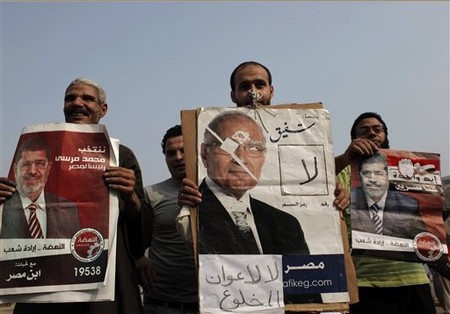There is a third way in Egypt.

In a recent editorial, the Washington Post urged the Obama administration to involve itself in the formation of a new government in Egypt:
The best way out of this predicament is a resumption of the democratic process. That means a free and fair presidential election on Sunday, and the militaryâ??s acceptance of a victory by Muslim Brotherhood candidate Mohammed Morsi if that is the result. Any attempt by the regime to manipulate the vote or the counting is likely to be detected â?? and must be quickly and resolutely opposed by the United States and other Western governments.The Supreme Military Council, which has ruled the country since Mr. Mubarakâ??s ouster, must then be pressed to fulfill its promise to hand over power to a civilian government by June 30.
Barry Rubin makes a similar case, albeit with a different outcome in mind:
So does it make sense for a U.S. government to take up the doctrine of â??neo-conservativeâ? naivete and demand a Brotherhood victory over the army in Egypt? A proper U.S. government would â?? and I apologize for the â??amoralâ? requirements of realpolitik â?? secretly be backing the military to keep the Brotherhood out of power. We now know that President Harry Trumanâ??s administration did certain things to ensure Communist parties didnâ??t win power in France and Italy which would not meet contemporary â??ethicalâ? standards of electoral results over American national security interests. Thank goodness for that!
In the spirit of bi-partisan bridge-building, let me suggest a third way: the U.S. should do nothing in Egypt. It's shocking, I know, to imagine an option whereby the United States forswears the prerogative to micromanage how another country manages its internal affairs, but it seems like the least-worst option when it comes to Egypt.
Rubin's use of a Cold War analogy is illustrative of just how low the contemporary stakes are in Egypt. Outside of passage through the Suez, are any U.S. national security interests endangered by Egypt? If anything, Washington runs the risk of creating new threats by taking a heavy hand in Egypt's internal politics. As the Post editorial notes, the U.S. is currently a de-facto ally of Egypt's military and is thus complicit, however tangentially, in its repression. That should end, but not because the U.S. has an abundance of faith in the Muslim Brotherhood's democratic credentials (that would indeed be naive) but because it's not at all clear that one particular "side" could win with U.S. help anyway.
(AP Photo)



